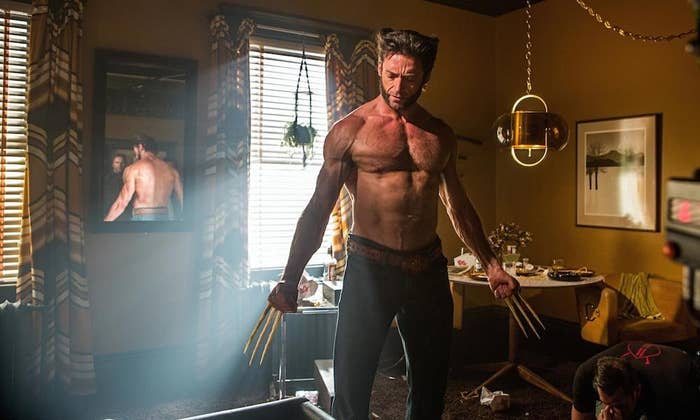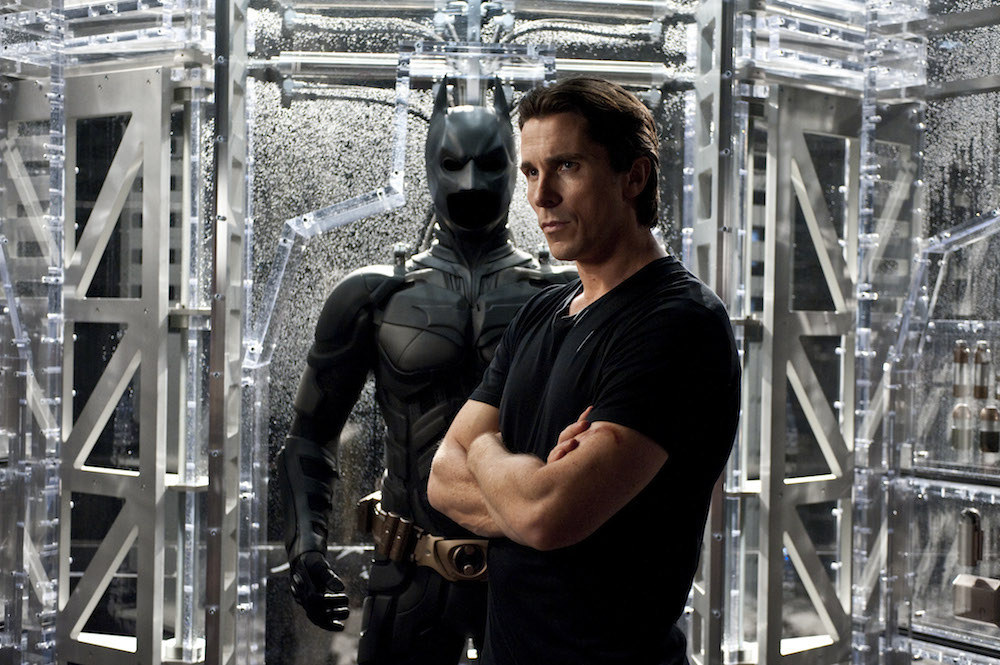
Because they're superheroes fighting for themselves rather than for All Mankind, because they're a team and not a solo act, and because their problem is political, not criminal, the X-Men seem set apart from the other superheroes.
Critic David Edelstein wrote that the first film based on the Marvel Comics mutant franchise was "about freaks yearning for normalcy, channeling the pain of their outsiderness into doing good, and fighting other freaks who've chosen a different, more vindictive path." The "mutants find the humanity and the fun in a genre," the Chicago Tribune said of the newest installment, Days of Future Past. "It's a remarkable invention, a superhero whose directive is empathy first, butt-kicking second," the review continued — these mutants, they're not like other superheroes. They fight inequality! There does appear to be a clear contrast between the explicitly evil nemeses of the 20th century and the ideologically driven superhero movie enemies of today, and that change did start in 2000, with the first X-Men movie. Looking at the superhero films among the top 20 box office performers each year since 1978, a true shift in the nature of villainy in these films didn't really occur until 2000, after which more villains in more movies became more complex and, perhaps, less outright evil. The progressive development is, however, an illusion.
Much like Superman, Batman, and Captain America, our X-Men heroes are still orphans (cast out by society!), but the villains they face have more murky motivations (fear of the unknown; crises of assimilation; mutant separatist aims). Despite the fact that the comic book X-Men was intended as an allegory for the civil rights movement of the '60s — because apparently white people want to understand black suffering through allegory — the series gets far too much praise for being progressive. In reality, the X-Men, just like all other superheroes, are fighting for the status quo, with a slight adjustment that allows mutants to participate in society as it is: They don't want change, they want to assimilate. As the mainstream gay rights movement is consumed with fighting for the rights of LGBT citizens to be just like straight people and, therefore, fighting to preserve institutions as they are, so the X-Men fight for their proverbial picket fences and their place in the military. Magneto and his mutant separatist cohort are the enemies of the X-Men because the enemy is the one agitating for change.
At its heart, the X-Men franchise is about structural inequality, not crime-fighting as such. Still, while "bad" mutants are instigating rebellion, "good" mutants want to assimilate. The X-Men continue an inherently conservative genre: Superman's avowed commitment to "truth, justice, and the American way" obviously precludes him from sedition, as does Batman's interest in maintaining his wealth and, therefore, the status quo. This is why superheroes can never escape their cornball tendencies: It's not because they have magical powers or because they wear tights, it's because no matter how evil their enemy is, they're still fighting change.



George Reeves as Superman in the 1950s TV series.
Superheroes as we've known them in the past 80 years are the most obvious distillation of the Ideal American — because our favorite superheroes (namely Superman, Batman, Spider-Man, and Captain America) are orphans, they can embody pure individualism. Despite their Rugged Individualism, they fight patriotically for the societal status quo; moreover, they "fight crime" in the way that U.S. authorities tell us to fight crime, which is to say by corporeally defeating "criminals." The science fiction writer Harlan Ellison called Superman, the original superhero, "our highest aspirations in human form," referring with that "our" to United States citizens since 1938, when America's favorite illegal immigrant first appeared in print, the invention of two Jewish first-generation American teenage boys from Cleveland. One of those boys, Jerry Siegel, said that when he created the hero, he'd imagined "a character like Samson, Hercules and all the strong men I ever heard tell of rolled into one. Only more so."
Even with these lofty ambitions, it wasn't until superheroes made the leap to film that they really gained traction with a wider audience and began to inform "our highest aspirations" on a grander scale. Although the heroes themselves have not changed drastically (how could they, when they've been ideal from the beginning?), the villains they fight onscreen have morphed from the simply evil into something more shadowy and imprecise. It would appear that superhero movies are getting smarter; if the villains aren't as straightforwardly evil, then surely these movies are showing a more nuanced picture of morality? But then, much like the background checks conducted on S.H.I.E.L.D. personnel, not everything is as it appears.
The raisons d'être of superheroes have always been their enemies, but the raisons d'être of those enemies have changed over time. The probable first superhero on screen was Captain Marvel, whose adventures were made into a 12-part serial in 1941; his enemy was Scorpion, who wanted the evil villain special: world domination. In 1951, George Reeves starred in the feature Superman and the Mole Men, where the enemy was PREJUDICE; the movie was followed by a low-budget TV series that ran until 1958, whose half-hour episodes "did not highlight crazed supervillains." Batman's first screen appearance was also in a film serial — he fought a Nazi scientist in 1943. In 1944, Captain America got his own film: He was fighting an evil foreigner. These early film interpretations of superheroes favored villains who were foreign and seeking world domination or who were criminally insane — perhaps because the ideology in these fantasy worlds was so strong that it was impossible to imagine unrest rising from within them. Superheroes fought many a Nazi, a motif which holds today (in 2014's The Winter Soldier, Captain America is still fighting Nazis). The first big superhero feature was Superman (1978), in which Lex Luthor wanted to commit mass murder for gains in real estate.
The villains are less foreign these days, and less maniacal. In 2008's The Dark Knight, Batman fought the Joker, whose philosophically driven goal was "diffuse terror." The Batman movie franchise was finally catching up to Frank Miller, Klaus Janson, and Lynn Varley's 1986 comic series The Dark Knight Returns, a series seemingly influenced by President Ronald Reagan's failed policy of trickle-down economics and growing, glaring income inequality; the series featured a darker Batman in a city where the rich were corrupt and the streets were racked by poverty. Batman in 1989 was, of course, darker than preceding Superman movies, but the criminals are made from the same mold: The 1989 Joker is criminally insane, with no particular thoughts behind his plan to use a drug to make the residents of Gotham City laugh to death. Subsequent big-screen Batman villains sought mayoral office, mind control of the populace via TV beamed into their brains, and mass murder followed by botanical takeover of the Earth. There is a shift from the attempted vegetable regime in 1997 to the attempt at the righteous destruction of corrupt Gotham City in 2005 (Batman & Robin and Batman Begins, respectively). The League of Shadows, with its reasoned position, is a far more sophisticated and realistic opponent than a resurrected lunatic who wants to replace all the people with hedges.

Some superhero franchises are plainly lagging behind in sophistication. Spider-Man, for one, consistently fights villains with no particular ideology beyond "badness," often with a healthy dose of "selfishness." Iron Man, too, in his solo movies, tends to fight villains motivated more by greed than a competing ideology, which is odd because Tony Stark himself is a successful CEO, born into wealth — though evidently not corrupted by it like the bad guys. Everything involving Thor is incredibly simplistic, which may make sense considering one of his moves is to literally hit people over the head with a hammer. In 2006, Superman was still dealing with the twisted real estate tycoon Lex Luthor (see: Superman, 1978), and in 2013 he was still dealing with aliens seeking mass murder and world domination (see: Superman II, 1981).
On the more sophisticated side are Captain America and the X-Men. With Captain America, this sophistication may be related to his measly screen history: Only two TV movies in the '70s and a straight-to-video movie in the '80s preceded Captain America: The First Avenger in 2011, so the Captain has less cinema-based nostalgia to get mired in. Although his main beef seems to be with the perennial bogeyman of Nazism and its descendants, his opponents can at least be said to have complex, human motivations that go beyond unqualified greed or power. Similarly, X-Men: Days of Future Past shows the heroes fighting for their survival after technology used to oppress mutants begins to oppress everyone, since any human may carry a mutant gene ("First they came for the man who had deadly laser beams coming out of his eyes and I did not speak out, because I did not have deadly laser beams coming out of my eyes…").
As literature scholars Dennis Dooley and Gary Engle wrote, "It is precisely because the characters and stories of Superman were created with no more complicated end in view than entertainment and the satisfaction of some basic human yearnings that the elements of this myth yield such a rich lode of pop cultural lore and say so much about the character and values of America." Batman and Captain America are scarcely younger than Superman and clearly modeled after his Super-ior; Spider-Man came later, but is mainly differentiated from Superman and Batman by his youth, not by his goals.
But the X-Men seem different. "There's a message about tolerance and openness and not fearing the unknown," said Claudia Puig at USA Today. Our collective faith in an alternative, reviled superhero, as contrasted with what Puig calls the "all-American" heroes, is placed in the X-Men because they're unloved. It's a misplaced faith. At heart, they're just like all the other superheroes: committed to convention.
